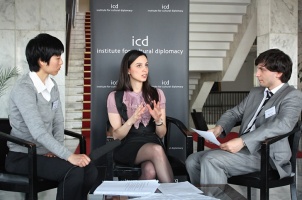Difference between revisions of "Ceren MutuÅŸ Toprakseven"
| Line 4: | Line 4: | ||
[[File:Toprakseven.jpg|400x200px|thumbnail|left]] | [[File:Toprakseven.jpg|400x200px|thumbnail|left]] | ||
| − | Culture is one of the main tools to resolve conflicts, because if you let states solve problems, it won’t go anywhere. Butut if you use culture and if you educate people and inform societies about these main issues and try to establish a common mindset on the problems, it can help to solve them. At this point, I believe that Cultural Diplomacy is very important; we should pay attention to the force of NGOs, think tanks, and individuals who are trying to | + | [[Culture]] is one of the main tools to resolve conflicts, because if you let states solve problems, it won’t go anywhere. Butut if you use culture and if you educate people and inform societies about these main issues and try to establish a common mindset on the problems, it can help to solve them. At this point, I believe that Cultural Diplomacy is very important; we should pay attention to the force of NGOs, think tanks, and individuals who are trying to stablish this link among countries and among societies, and after that I think there will be a common mind to solve the problem. |
- The Ankara Conference on Peace-building & Reconciliation; Ankara, Turkey, April 2012 | - The Ankara Conference on Peace-building & Reconciliation; Ankara, Turkey, April 2012 | ||
[[Category:Statements on the Significance of Cultural Diplomacy]] | [[Category:Statements on the Significance of Cultural Diplomacy]] | ||
Latest revision as of 14:25, 1 April 2014
The Importance of Cultural Diplomacy in Resolving Conflict By Ceren Mutuş Toprakseven (Researcher, Center for Middle Eastern & African Studies, International Strategic Research Organization; Turkey)
Culture is one of the main tools to resolve conflicts, because if you let states solve problems, it won’t go anywhere. Butut if you use culture and if you educate people and inform societies about these main issues and try to establish a common mindset on the problems, it can help to solve them. At this point, I believe that Cultural Diplomacy is very important; we should pay attention to the force of NGOs, think tanks, and individuals who are trying to stablish this link among countries and among societies, and after that I think there will be a common mind to solve the problem.
- The Ankara Conference on Peace-building & Reconciliation; Ankara, Turkey, April 2012
